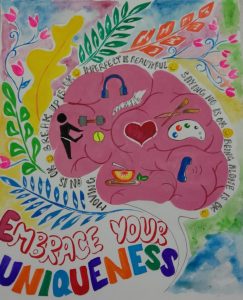Connection During Disconnected Times – World Mental Health Day
Since the wake of the pandemic, our daily lives have changed considerably and have brought many challenges – from healthcare workers to students adapting to the new normal, everything has gone for a toss. What do we do when life takes a 360-degree turn all around the world? And for those reeling from social isolation, this situation has taken a toll on their mental health. Factors such as significant lifestyle changes, politics, family, academic pressure, relationship issues, and money can all contribute to changes in mental health, along with social isolation.
A recent mental health study done on over almost 8,000 individuals found that college students were the most affected by the novel coronavirus pandemic and the lockdown. Many students feel fear and anxiety when they first recognize a mental health issue within themselves, as they might not be able to figure out where it came from. Experts and researchers use terms like “epidemic” and “crisis” to characterize the mental health challenges currently facing college students. From stress management to a plethora of mindfulness techniques, there are ways in which students can use coping and grounding techniques while taking professional help.
Here are some ways in which you can recognize signs of unbalanced mental health:
- You don’t enjoy the activities that you once used to
- You no longer attend classes or social outings
- You are experiencing extreme anger or sadness over a relationship in their life
- You react negatively or tend to be apathetic to most things
- You often talk about death or suicide
During such uncertain times, it becomes important to remind ourselves to take things one day at a time, or in other words, be mindful and present. We tend to be preoccupied with what could/could not happen which makes us lose focus on what actually is happening. It is also important to note how people with pre-existing mental health conditions go through an extremely difficult time, as their symptoms are exacerbated due to the pandemic. The lack of proper facilities or unavailability of healthcare professionals makes it easier for people to relapse in case of high distress or those in recovery. As for students, most of them are in a fragile situation and a lot of research talks about how they are more prone to anxiety, stress and feelings of loneliness. While students are happy to be back home and are able to reconnect with family, the abrupt pause in real-time classes has remarkably affected their well-being, as coursework has transitioned to virtual learning which has put a strain on their social support system and extracurriculars. As students across the world await their commencement or graduation ceremonies, it has not been possible for many, which makes the students unable to grapple with the current state of affairs. Right from seeking employment to getting their paycheck, it has been quite the struggle as there has been considerable pay reduction or cancellation of job offers. Financial stress has really added on and for students who especially study abroad, it becomes even harder as they are missing out on the wholesome college experience.
For students to get the support they need, traditional coping mechanisms like social interaction or taking a vacation have been strained due to the interference of quarantine measures. As the fear of uncertainty and lack of control creeps in, we eventually start to lose hope for a better future. While many of us take comfort in following our daily routine and setting goals, that has not been very stable which adds on to the layer of stress. Uncertainty breeds anxiety after all.
Students who are close to graduating feel a wave of frustration because they should be finishing, but somehow the ending seems to be getting convoluted and hazy. As a first step, we need to remind ourselves that no matter what, we are trying our best. And if things do not meet our expectations, it is common for us to feel “I am not cut out for this” and go on a downward spiral which only further drags us down to rock bottom.
It is during these times that techniques like Mindfulness, Acceptance and Commitment Therapy (ACT) which really strengthens our mind and gives more clarity. Acceptance is always key. Being fully aware of the present and accepting the circumstances despite the uncertainty takes a lot of practice and effort, but once we get there, our well-being drastically improves. And we become more focused on making the most of the present time, rather than anxious or intrusive thoughts taking over.
A healthy mind cannot be isolated from the various external factors it is a product of. So unless the concerns discussed above and the students’ expectations are addressed, it is unlikely that any effort to improve the mental health conditions of students will succeed. Colleges can try to get the students to interact by conducting webinars on mental health, by spreading awareness. Moreover, it would make them feel a little less alone. Isn’t that what we all need?
A few helpful tips to cope with stress and feelings of uncertainty would be:
- To know that it is okay to feel what you are feeling, and you are definitely not alone in this – not to suppress negative emotions but to accept them as they come.
- Maintain a routine – set small attainable goals and work towards them, with dedication and consistency
- Practice good sleep and hygiene – limiting screen time and practising self-care would go a long way in improving mental well-being
- Connect with friends and family – engaging in regular video calls or conversing on social media would help with feelings of being secluded and lonely
- Take short breaks – keeping other work aside, sparing a few moments for meditation or even a short walk which really amplifies the energy levels









